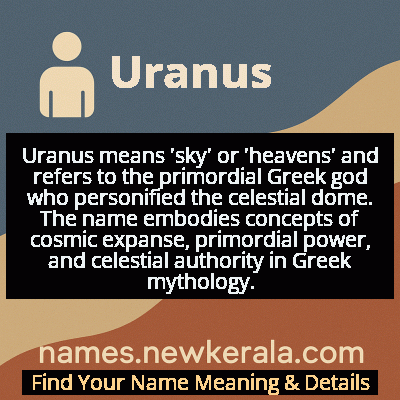Uranus Name Meaning & Details
Origin, Popularity, Numerology Analysis & Name Meaning of Uranus
Discover the origin, meaning, and cultural significance of the name URANUS. Delve into its historical roots and explore the lasting impact it has had on communities and traditions.
Name
Uranus
Gender
Male
Origin
Greek
Lucky Number
4
Meaning of the Name - Uranus
Uranus means 'sky' or 'heavens' and refers to the primordial Greek god who personified the celestial dome. The name embodies concepts of cosmic expanse, primordial power, and celestial authority in Greek mythology.
Uranus - Complete Numerology Analysis
Your Numerology Number
Based on Pythagorean Numerology System
Ruling Planet
Uranus (Rahu)
Positive Nature
Strong sense of order, loyal, practical, and disciplined.
Negative Traits
Stubborn, overly serious, rigid, and prone to feeling restricted.
Lucky Colours
Blue, gray.
Lucky Days
Saturday.
Lucky Stones
Blue sapphire.
Harmony Numbers
1, 7, 8.
Best Suited Professions
Managers, engineers, accountants, organizers.
What People Like About You
Dependability, discipline, practicality.
Famous People Named Uranus
Uranus (Ouranos)
Primordial deity
Original ruler of the universe, father of the Titans and Cyclopes
William Herschel
Astronomer
Discovered the planet Uranus in 1781, naming it after the Greek sky god
Uranus P. Smith
American pioneer
Early settler and community founder in the American Midwest
Name Variations & International Equivalents
Click on blue names to explore their detailed meanings. Gray names with will be available soon.
Cultural & Historical Significance
In Renaissance and Enlightenment Europe, Uranus experienced a cultural revival as classical learning was rediscovered and expanded. The discovery of the planet Uranus in 1781 by William Herschel represented a significant moment in scientific history, as it was the first planet discovered with a telescope and expanded humanity's understanding of the solar system. This astronomical connection reinforced the name's association with innovation, discovery, and the expansion of human knowledge. The naming followed the tradition of using mythological figures for celestial bodies, creating a lasting bridge between ancient cosmology and modern astronomy that continues to influence how we conceptualize our place in the universe.
Extended Personality Analysis
Individuals named Uranus are often perceived as possessing visionary and expansive qualities, reflecting their namesake's cosmic domain. They tend to exhibit intellectual curiosity, innovative thinking, and a broad perspective on life, much like the sky god who encompassed the entire heavens. These individuals often demonstrate leadership qualities and a natural authority, though they may sometimes struggle with maintaining emotional connections due to their tendency toward abstract thinking. Their association with the primordial sky suggests a personality that values freedom, independence, and the exploration of new ideas and territories.
The mythological Uranus's conflict with his children suggests potential challenges in paternal relationships or authority dynamics, which might manifest as difficulty with delegation or sharing power. However, their connection to the celestial realm often grants them unique insights and the ability to see beyond immediate circumstances, making them natural innovators and forward-thinkers who challenge conventional boundaries. In modern psychological terms, those named Uranus might exhibit Uranian qualities as described in astrology: originality, inventiveness, humanitarian ideals, and a tendency toward sudden breakthroughs or changes. They often serve as catalysts for transformation in their communities or fields, embodying the revolutionary spirit of their mythological and astronomical namesake.
Modern Usage & Popularity
In contemporary naming practices, Uranus remains an exceptionally rare choice for several significant reasons. The primary deterrent is the unfortunate homophonic similarity to 'urine' in English-speaking countries, which has largely prevented its adoption despite its rich mythological heritage. Additionally, its strong association with the seventh planet makes it feel more like an astronomical term than a personal name. The name sees occasional use in Greece and among classical scholars or mythology enthusiasts who appreciate its profound mythological roots, though even in these contexts it remains uncommon. Its usage is more frequent in fictional contexts, particularly in fantasy literature, anime, and science fiction, where creators can leverage its cosmic and mythological connotations without the practical social challenges. The name's extreme rarity makes it a distinctive choice, though parents considering it must carefully weigh its rich classical heritage against potential teasing or mispronunciation in daily life.
Symbolic & Spiritual Meanings
Uranus symbolizes the infinite expanse of the sky, representing freedom, limitless potential, and cosmic consciousness. As the primordial sky deity, it embodies the concept of vastness, both physically and intellectually, suggesting boundless imagination and the ability to see the 'big picture' beyond earthly limitations. The mythological narrative of Uranus being overthrown by his son Cronus adds layers of symbolism related to revolution, generational change, and the inevitable progression of time and power structures. In astrological contexts, the planet Uranus represents innovation, rebellion, sudden change, technological advancement, and humanitarian ideals, reflecting the god's association with the heavens and cosmic order. The name carries profound connotations of celestial authority, creative potential, and the fundamental forces that shape existence, making it a powerful symbolic choice representing both cosmic origins and futuristic vision. It serves as a bridge between ancient mythological understanding of the cosmos and modern scientific exploration of the universe.

